Mary Anne Yarde's Blog: The Coffee Pot Book Club , page 153
February 15, 2019
#BookReview — Pit of Vipers: Sons of Kings #2 by Millie Thom #HistoricalFiction #Vikings #AngloSaxon @MillieThom
Amazon UK • Amazon US
Millie Thom
 Millie Thom is a former geography and history teacher with a degree in geology and a particular passion for the Anglo-Saxon and Viking period. Originally from Lancashire she is a mother of six grown up children and now lives with her husband in a small village in Nottinghamshire, midway between the town of Newark and the lovely old city of Lincoln. When not writing, Millie enjoys long walks and is a serious fossil hunter. She is also an avid traveller, swimmer and baker of cakes!
Millie Thom is a former geography and history teacher with a degree in geology and a particular passion for the Anglo-Saxon and Viking period. Originally from Lancashire she is a mother of six grown up children and now lives with her husband in a small village in Nottinghamshire, midway between the town of Newark and the lovely old city of Lincoln. When not writing, Millie enjoys long walks and is a serious fossil hunter. She is also an avid traveller, swimmer and baker of cakes!Connect with Millie : Website • Twitter• Goodreads.
Published on February 15, 2019 22:30
Read an excerpt of Mary Anne Yarde’s — The Du Lac Prophecy (Book 4 of The Du Lac Chronicles) #Arthurian #HistoricalFiciton #KindleUnlimied
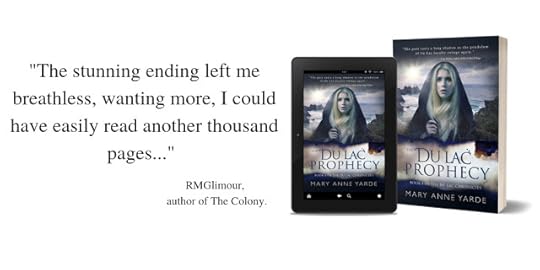 The Du Lac Prophecy(Book 4 of The Du Lac Chronicles)By Mary Anne Yarde
The Du Lac Prophecy(Book 4 of The Du Lac Chronicles)By Mary Anne Yarde
Two Prophesies. Two Noble Households. One Throne.
Distrust and greed threaten to destroy the House of du Lac. Mordred Pendragon strengthens his hold on Brittany and the surrounding kingdoms while Alan, Mordred’s cousin, embarks on a desperate quest to find Arthur’s lost knights. Without the knights and the relics they hold in trust, they cannot defeat Arthur’s only son – but finding the knights is only half of the battle. Convincing them to fight on the side of the Du Lac’s, their sworn enemy, will not be easy.
If Alden, King of Cerniw, cannot bring unity there will be no need for Arthur’s knights. With Budic threatening to invade Alden’s Kingdom, Merton putting love before duty, and Garren disappearing to goodness knows where, what hope does Alden have? If Alden cannot get his House in order, Mordred will destroy them all.
Excerpt
“I feared you were a dream,” Amandine whispered, her voice filled with wonder as she raised her hand to touch the soft bristles and the raised scars on his face. “I was afraid to open my eyes. But you really are real,” she laughed softly in disbelief. She touched a lock of his flaming red hair and pushed it back behind his ear. “Last night…” she studied his face intently for several seconds as if looking for something. “I am sorry if I hurt you. I didn’t know who you were, and I didn’t know where I was. I was scared.”
“You certainly gave me a walloping,” he grinned gently down at her, his grey eyes alight with humour. “I think you have the makings of a great mercenary. I might have to recruit you to my cause.”
She smiled at his teasing, but then she began to trace the scars on his face with the tips of her fingers, and her smile disappeared. “Do they still hurt?”
“Yes,” Merton replied. “But the pain I felt when I thought you were dead was a hundred times worse. Philippe had broken my body, but that was nothing compared to the pain in my heart. Without you, I was lost.”
“That day… When they beat you. You were so brave,” Amandine replied.Her fingers felt like butterflies on his skin, so soft and gentle. He closed his eyes to savour the sensation.
“I never knew anyone could be that brave,” Amandine continued. “You could have won your freedom and yet, you surrendered to their torture to save me. Why? I am but one person. Just one amongst so many.”
“Why do you think?” Merton asked shakily, opening his eyes to look at her again, hoping she could see the depth of his love in his scarred and deformed face.
“I gave you these scars,” Amandine stated with a painful realisation, her hand dropping away from his face. “You are like this because of me,” her voice was thick with unshed tears.
“No, not because of you,” Merton immediately contradicted. “My reputation, Philippe’s greed, Mordred’s hate, and Bastian’s fear, gave me these scars—”
“I should not have gone back to your chamber. If they had not found me there, then they would never have known about us. If they had not known, then you would have had no cause to surrender. Bastian would not have taken your sword arm.” Amandine touched what was left of his arm. “Philippe would not have lashed you.” She touched his face again and shook her head. “I am to blame.” She sat up and her eyes filled with tears, her hand fell away from his face. “I am to blame,” she said again as a tear slipped down her cheek. “How can you stand to be near me?”
Amazon UK • Amazon US • Amazon CA
Mary Anne Yarde
 Mary Anne Yarde is the multi award-winning author of the International Bestselling Series — The Du Lac Chronicles. Set a generation after the fall of King Arthur, The Du Lac Chronicles takes you on a journey through Dark Age Briton and Brittany, where you will meet new friends and terrifying foes. Based on legends and historical fact, The Du Lac Chronicles is a series not to be missed.
Mary Anne Yarde is the multi award-winning author of the International Bestselling Series — The Du Lac Chronicles. Set a generation after the fall of King Arthur, The Du Lac Chronicles takes you on a journey through Dark Age Briton and Brittany, where you will meet new friends and terrifying foes. Based on legends and historical fact, The Du Lac Chronicles is a series not to be missed.Mary Anne is the founder of The Coffee Pot Book Club. She has been a professional reader since 2016 and in this time Mary Anne has reviewed many books for the big and small publishing houses, as well as books penned by her fellow indie authors. Mary Anne is an editorial reviewer for The Coffee Pot Book Club and BooksGoSocial. Mary Anne has been a judge for a prestigious Historical Fiction Book Award for the last three years, as well as being a Top Reviewer on Netgalley.
Born in Bath, England, Mary Anne Yarde grew up in the southwest of England, surrounded and influenced by centuries of history and mythology. Glastonbury — the fabled Isle of Avalon — was a mere fifteen-minute drive from her home, and tales of King Arthur and his knights were part of her childhood.
Connect with Mary Anne: Website • Facebook • Twitter • Amazon Author Page• Goodreads.
Published on February 15, 2019 10:12
February 14, 2019
#Giveaway — We Shall See The Sky Sparkling, by Susana Aikin #HistoricalFiction #HFVBTPartner #HFVBTBlogTours @Susana_Aikin @hfvbt @KensingtonBooks
Historical Fiction Virtual Blog Tours Presents…

We Shall See The Sky SparklingBy Susana Aikin

Set in London and Russia at the turn of the century, Susana Aikin’s debut introduces a vibrant young woman determined to defy convention and shape an extraordinary future.
Like other well-bred young women in Edwardian England, Lily Throop is expected to think of little beyond marriage and motherhood. Passionate about the stage, Lily has very different ambitions. To her father’s dismay, she secures an apprenticeship at London’s famous Imperial Theatre. Soon, her talent and beauty bring coveted roles and devoted admirers. Yet to most of society, the line between actress and harlot is whisper-thin. With her reputation threatened by her mentor’s vicious betrayal, Lily flees to St. Petersburg with an acting troupe–leaving her first love behind.
Life in Russia is as exhilarating as it is difficult. The streets rumble with talk of revolution, and Lily is drawn into an affair with Sergei, a Count with fervent revolutionary ideals. Following Sergei when he is banished to Vladivostok, Lily struggles to find her role in an increasingly dangerous world. And as Russian tensions with Japan erupt into war, only fortitude and single-mindedness can steer her to freedom and safety at last.
With its sweeping backdrop and evocative details, We Shall See the Sky Sparkling explores a fascinating period in history through the eyes of a strong-willed, singular heroine, in a moving story of love and resilience.
“Aikin’s novel is expertly plotted and rife with historical details in both its English and Russian settings, making for a rich story of the prejudices women faced at the turn of the 20th century and how the class disparity in Russia ignited the flame of revolution.” Publishers Weekly.
“Beginning and ending with letters written to her family, this novel has the feel of a serial drama. Readers of Pam Jenoff and Eva Stachniak will appreciate the strong-willed and artistically driven female character who finds her own way through difficult times.” Library Journal
Giveaway
During the Blog Tour we will be giving away a paperback copy of We Shall See the Sky Sparkling! To enter, click
HERE!
Giveaway Rules
• Giveaway ends at 11:59pm EST on February 28th. You must be 18 or older to enter.
• Giveaway is open to US only.
• Only one entry per household.
• All giveaway entrants agree to be honest and not cheat the systems; any suspect of fraud is decided upon by blog/site owner and the sponsor, and entrants may be disqualified at our discretion.
• Winner has 48 hours to claim prize or new winner is chosen.
Purchase your copy of We Shall See The Sky Sparkling.
AMAZON • BARNES AND NOBLE • BOOKS-A-MILLION • INDIEBOUND
Susana Aikin
 Born in Spain of an English father and a Spanish mother, Susana Aikin is a writer and a filmmaker who has lived and worked in New York City since 1982. She was educated in both England and Spain; studied law at the University of Madrid, and later Creative Writing at Manchester Metropolitan University, UK. In 1986 she started her own independent film production company, Starfish Productions, producing and directing documentary films that won her multiple awards, including an American Film Institute grant, a Rockefeller Fellowship, and an Emmy Award in 1997. She started writing fiction full time in 2010. She has two sons and now lives between Brooklyn and the mountains north of Madrid.For more information, visit Susana Aikin’s website.
Born in Spain of an English father and a Spanish mother, Susana Aikin is a writer and a filmmaker who has lived and worked in New York City since 1982. She was educated in both England and Spain; studied law at the University of Madrid, and later Creative Writing at Manchester Metropolitan University, UK. In 1986 she started her own independent film production company, Starfish Productions, producing and directing documentary films that won her multiple awards, including an American Film Institute grant, a Rockefeller Fellowship, and an Emmy Award in 1997. She started writing fiction full time in 2010. She has two sons and now lives between Brooklyn and the mountains north of Madrid.For more information, visit Susana Aikin’s website.Connect with Susana: Facebook• Twitter • Instagram • Pinterest • Goodreads.
Published on February 14, 2019 23:00
February 13, 2019
A conversation with Historical Fiction author, Jennifer C. Wilson #amwriting #HistoricalFiction #York @inkjunkie1984
A conversation with Historical Fiction author, Jennifer C. Wilson
 Hello! I’m Jen, writing under Jennifer C. Wilson (I’ve always been very proud of my ‘C’!), in the genre of historical fiction, and paranormal historical fiction.
Hello! I’m Jen, writing under Jennifer C. Wilson (I’ve always been very proud of my ‘C’!), in the genre of historical fiction, and paranormal historical fiction. Hi Jen, it is so great to have you back on the blog. I have always been intrigued by your stories. What inspired you to write Kindred Spirits: York?
Kindred Spirits: York is the fourth of the Kindred Spirits series, so in terms of overall inspiration, it’s the continuation of a world I’ve been writing since 2013, the first having been published in 2015. In terms of York specifically, I wanted to write a novel set closer to home, and in a location I knew well again. York is a city I’ve been visiting since I was a child, so I know the main settings, but it was great fun getting to know places I had never even heard of.
 Barley Hall — York.
Barley Hall — York.York is one of my favourite cities as well. Did you face many challenges with regards to researching for your series?
The Kindred Spirits series have always been challenging from a research perspective, due to the concept of characters from almost any period of history all ‘mucking in’ together. In York, I’ve got Romans rubbing shoulders with Vikings, a Plantagenet Duke, and a highwayman, so there was quite a bit of reading to do. Having said that, with the series being set in the modern day, it does mean I can get away with a few anachronisms. I remember writing a scene for Book One where Anne Boleyn rolled her eyes, replying to an insult with ‘whatever’. I think though, given that all my characters are ghosts, and that some have been dead (and together) for centuries, then of course they’re going to pick up some bits of modern language and slang. Not that I have them going around speaking in text-speak, and I have tried to stay true in terms of historical voices, but it does take the pressure off. And after all, somebody like Anne Boleyn was, in her own way, a very modern character, so she fits in to the modern time quite nicely.
As for York itself, the majority of my research was to visit the various locations. I really enjoy getting under the skin of a place, whether I’ve been there a dozen times before, or never in my life.
I love the way there are so many characters in your book. Historical Fiction is a very competitive field. Can you tell us three things that set your noels apart?
That’s a tricky one. But I think I would go for:
•It’s only a quasi-historical fiction novel, perhaps? The ghosts of historical characters, in contemporary settings, so there’s no need to worry if you’re not completely knowledgeable in any particular era.
• I get to ‘mix and match’ my people and settings. This time, for example, we have Harry Hotspur settling down for a chat with Guy Fawkes and Dick Turpin in Barley Hall. This is the bit I really enjoy, if I’m honest, thinking about which historical characters will or will not get on – where friendships will form, or fireworks fly!
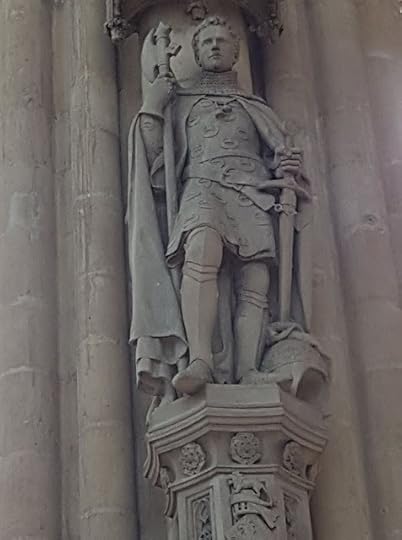 Harry Hotspur.
Harry Hotspur.• I like to think they’re a light-hearted approach to historical fiction. Not that most historical fiction is overly, or too serious, but there are often big issues being included. With the Kindred Spirits series books, that hasn’t really been the case, and hopefully, that makes them a nice, easy and fun read for people.
One last question, can you tell us what you are currently working on?
I’m working a project very close to my heart at the moment: The Raided Heart. It’s a historical romantic adventure, set in the world of the border reivers, on the Anglo-Scottish border, and one which I wrote the first draft of when I was just a teen. Clearly, the quality back then wasn’t particularly high, but the core plot is there, and I’m happy with it, so I’m reworking that, with the aim of self-publishing it later in 2019, all being well.
Thank you so much, Jennifer, for taking the time out to chat with us.
Scroll down to find out more about Kindred Spirits: York
Kindred Spirits: York

In the ancient city of York, something sinister is stirring...What do a highwayman, an infamous traitor, and two hardened soldiers have in common? Centuries of friendship, a duty to the town, and a sense of mischief – until they realise that someone is trying to bring chaos to their home.
Joining forces with local Vikings, the four friends keep an eye on the situation, but then, disaster strikes.
Can peace be restored both inside and out of the city walls?
Amazon UK
Jennifer C. Wilson
 Jennifer C. Wilson is a marine biologist by training, who developed an equal passion for history and historical fiction whilst stalking Mary, Queen of Scots on childhood holidays (she has since moved on to Richard III). Enrolling on an adult education workshop on her return to the north-east of England for work reignited her pastime of creative writing, and she has been filling notebooks ever since. In 2014, Jennifer won the Story Tyne short story competition, and has been working on a number of projects since, including co-hosting the North Tyneside Writers’ Circle. Her Kindred Spirits novels are published by Crooked Cat Books and her timeslip novella, The Last Plantagenet?, by Ocelot Press.
Jennifer C. Wilson is a marine biologist by training, who developed an equal passion for history and historical fiction whilst stalking Mary, Queen of Scots on childhood holidays (she has since moved on to Richard III). Enrolling on an adult education workshop on her return to the north-east of England for work reignited her pastime of creative writing, and she has been filling notebooks ever since. In 2014, Jennifer won the Story Tyne short story competition, and has been working on a number of projects since, including co-hosting the North Tyneside Writers’ Circle. Her Kindred Spirits novels are published by Crooked Cat Books and her timeslip novella, The Last Plantagenet?, by Ocelot Press. She lives in North Tyneside, and is very proud of her approximately 2-inch view of the North Sea.
Connect with Jennifer: Website• Amazon • Facebook • Twitter • Instagram.
Published on February 13, 2019 23:00
Finding Stories in Legends: The Anglo-Saxon World, by Annie Whitehead #History #AngloSaxons #HistoricalFiction @ALWhitehead63
Finding Stories in Legends: The Anglo-Saxon WorldBy Annie Whitehead
A royal son, in defiance of his frail and useless father, released the king’s prisoner from jail and married her, before leading the kingdom in an heroic fight against the invaders. A king went to war because his sister had been mistreated. A princess was accused of killing her little brother and her punishment was that her eyeballs fell out. A teenaged king was found in bed on his wedding night with his wife and her mother…
These are all tales worthy of books. Even Films maybe. But they’re tales of Anglo-Saxons, so you might not have heard of them.
It’s less true now, thanks to The Vikings TV series, The Last Kingdom – TV series and books - but the Anglo-Saxon period has at times suffered from a lack of interest.
But why? A bit of shameless name-dropping here: Over lunch one day, Fay Weldon told me that she thought it had a fair bit to do with the costumes. The Tudors, for example, had exquisite clothing and accurate paintings which can be used to reproduce the garments for telly shows. The Anglo-Saxons left only drawings which lacked perspective and detail and yes, it’s fair to say that in comparison, their clothes were a shade less flamboyant.There’s a big line, too, drawn across history and making a cultural and documentary barrier: 1066. For a long time, the Anglo-Saxons were separated from us by that line, seen as a people from a far-off, almost mythical world. The ‘Dark Ages’ is now termed the ‘Early Medieval’ period but that tends to mean that the Anglo-Saxons are presumed to have had the same medieval ideas as the Normans, when in fact their laws, particularly relating to women, were a lot more enlightened.
I’m a historian, so I like to sift and sieve, trying to tease the facts from a jumble of chronicles written by people who had a political agenda and told the stories from their own point of view. But I’m an author, too – so I like to get behind the facts and envisage the real people.
 From Bede's Lives of St. Cuthbert, showing King Athelstan
From Bede's Lives of St. Cuthbert, showing King Athelstan
Scenarios described in the opening paragraph have already formed the basis of two of my novels.
Penda was a pagan warlord who fought against the Northumbrian kings. Bede, a Northumbrian, naturally enough didn’t have much in the way of pleasant things to say about him. But tucked away in Bede’s Ecclesiastical History of the English People are a couple of nuggets about Penda: he was tolerant of Christians and he went to war because a neighbouring king repudiated his wife, who happened to be Penda’s sister. Two short sentences allowed me to build up a picture of a man whose motives for war were much less clear-cut and not necessarily driven by bigotry. A man loyal, above all else, to his family. This man intrigued me.
 The Venerable Bede
The Venerable Bede
To miss out on Anglo-Saxon history is to miss out on a treat. Such a wealth of stories, such an array of characters…
That three-in-a-bed romp? Well, it may or may not be completely true, but as an opening chapter it served me well. The alleged incident caused widespread fall-out and shaped the politics of tenth-century England. And the novel it inspired also includes the next king’s wife who just happened to be accused of murdering an abbot, colluding with the king in the killing of her first husband, oh, and that of her stepson too. Those women made rather sumptuous ‘bookends’! Behind the fruity gossip though, were a young woman whose reputation was besmirched, and a queen who had to give up two of her children when she married the king, and then lost another when he was still an infant.
 King Edgar, from the New Minster Charter, 966.
King Edgar, from the New Minster Charter, 966.
Another woman whose life story packs a metaphorical punch is Æthelflæd, Lady of the Mercians, daughter of Alfred the Great. She ruled a country in all but name and was instrumental in holding back the Viking onslaught. She probably never wielded a sword yet her story is fascinating none the less. How did she, who was only half-Mercian and a woman, manage to command the loyalty of the Mercian troops? I’ve pondered the paradox of her status many times, in fiction, nonfiction, and even on the ‘stage’.I still have questions. Why was this remarkable woman so little remarked upon? Her leadership of a kingdom, whether as a politician or a sword-swinging warrior-woman, was unprecedented. Yet the chroniclers either took this completely in their stride, or, with a couple of exceptions, ignored it all together. I couldn’t not write her story.
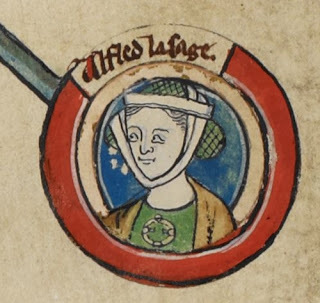 Æthelflæd, from a 14th-century genealogical chronicle
Æthelflæd, from a 14th-century genealogical chronicle
All of my fiction happens to be set in Mercia, the ancient kingdom of the Midlands. So, having written three novels, I realised that I had enough material, along with my original undergrad notes and research books, to undertake the telling of the story of Mercia itself. Here I was able to search for the truth behind such legends as:
Offa – not just a dyke-builder but a major player on the international stage, getting himself involved in a trade war with the emperor, Charlemagne. (Okay, there was a little bit of murder, too…)
Also from Mercia were Lady Godiva - did she really ride naked through the streets of Coventry? – and Eadric Streona, whose name means ‘The Grasper’ and who turned round and changed sides so often during the wars with Cnut that he must have got positively dizzy. In the end, Cnut ordered that Eadric should be paid what was owed him, and one can imagine how he then drew his finger across his throat as he gave the command. Statue of Lady Godiva in Coventry.
Statue of Lady Godiva in Coventry.
Exciting as these tales are, the Anglo-Saxons were so much more than this. Their world was not one of ‘sword and sorcery.’ They weren’t illiterate heathens (well, Penda was, but this didn’t make him bad); they were real people, whose laws were sophisticated and whose metal-working skills were exquisite. (Think Staffordshire Hoard or the Sutton Hoo treasures.) Their love of tales and drama means that there is a wealth of material from which to draw. Some of those tales are indeed lurid, but it doesn’t take much scratching to reveal the human stories underneath.
Sometimes it is merely a footnote: the main character of one of my novels had no recorded wife. But a woman is mentioned as having been deprived of property by his successor. Was she his widow? If they weren’t married, did they have a relationship? Writing historical fiction means being guided by the facts, but sometimes it requires reading between the lines, too. Look closely and there you’ll find the stories.
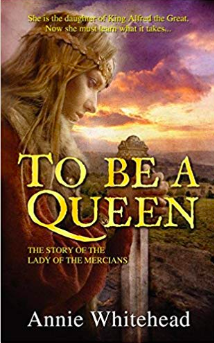 To Be A Queen
To Be A Queen
This is the true story of Aethelflaed, the 'Lady of the Mercians', daughter of Alfred the Great. She was the only female leader of an Anglo-Saxon kingdom. It is the tale of one family, two kingdoms and a common enemy. Born into the royal house of Wessex at the height of the Viking wars, she is sent to her aunt in Mercia as a foster-child, only to return home when the Vikings overrun Mercia. In Wessex, she witnesses another Viking attack and this compounds her fear of the enemy. She falls in love with a Mercian lord but is heartbroken to be given as bride to the ruler of Mercia to seal the alliance between the two Anglo-Saxon kingdoms. She must learn to subjugate her feelings for her first love, overcome her indifference to her husband and win the hearts of the Mercians who despise her as a foreigner, twice making an attempt on her life. When her husband falls ill and is incapacitated, she has to learn to rule and lead an army in his stead and when he subsequently dies, she must fight to save her adopted Mercia from the Vikings and, ultimately, her own brother.
Amazon UK • Amazon US
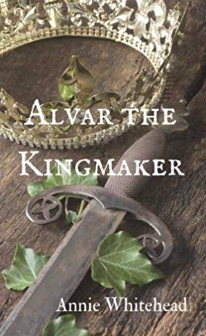 Alvar the Kingmaker
Alvar the Kingmaker
In 10th Century England,nobleman Alvar knows that securing the throne for the young and worthy King Edgar will brand him as an oath-breaker. As a fighting man, he is indispensable to the new sovereign, but his success and power gain him deadly, murderous enemies amongst those who seek favour with the king. Alvar must fight to protect his lands, and his position, and learn the subtle art of politics. He must also, as a man of principle, keep secret his love for the wife of his trusted deputy. Civil war erupts, and Alvar once again finds himself the only man capable of setting a new king upon the throne of England, an act which comes at great personal cost. His career began with a dishonourable deed to help a good king; now he must be loyal to a new king, Aethelred, whom he knows will be weak, and whose supporters have been accused of regicide. Can he bring about peace, reconcile with his enemies, and find personal happiness, whilst all the time doing his duty to his loved ones? And what of the fragile Queen, who not only depends upon him but has fallen in love with him? Aelfhere (Alvar) of Mercia was known to the chroniclers as the "The blast of the mad wind from the Western territories" but also as "The glorious earl." This is his story.-->
Amazon UK • Amazon US
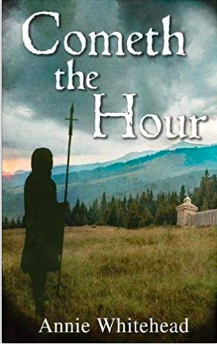 Cometh the Hour - Tales of the Iclingas Book 1
Cometh the Hour - Tales of the Iclingas Book 1
In seventh century England, a vicious attack sets in motion a war of attrition which will last for generations.
Four kings, connected by blood and marriage, vie for the mantle of overlord. Three affect to rule with divine assistance. The fourth, whose cousin and sister have been mistreated and whose friend has been slaughtered, watches, and waits.
He is a pagan, he is a Mercian, and his name is Penda.
By his side is a woman determined to escape her brutal past. She aids his struggle against his treacherous brother and their alliance founds a dynasty with the potential to end injustice and suppression, if only they can continue to stand together...
A story that spans generations, and travels from Sutton Hoo to the Holy Island of Lindisfarne and back to the buried treasure of Staffordshire, this is the first volume of the tales of the Iclingas, the family who ruled Mercia, fighting to avenge their kin and to keep their people free.-->
Amazon UK • Amazon US
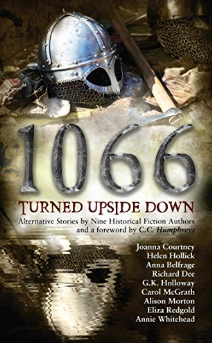 1066 Turned Upside Down: Alternative fiction stories by nine authors
1066 Turned Upside Down: Alternative fiction stories by nine authors
Ever wondered what might have happened if William the Conqueror had been beaten at Hastings? Or if Harald Hardrada had won at Stamford Bridge? Or if Edward the Confessor had died with an heir ready to take his place? Then here is the perfect set of stories for you. ‘1066 Turned Upside Down’ explores a variety of ways in which the momentous year of 1066 could have played out differently.
Written by nine well-known authors to celebrate the 950th anniversary of the Battle of Hastings, the stories will take you on a journey through the wonderful ‘what ifs’ of England’s most famous year in history.-->
Amazon UK • Amazon US
 Mercia: The Rise and Fall of a Kingdom
Mercia: The Rise and Fall of a Kingdom
Many people know about Wessex, the ‘Last Kingdom’ of the Anglo-Saxons to fall to the Northmen, but another kingdom, Mercia, once enjoyed supremacy over not only Wessex, but all of the Anglo-Saxon kingdoms. At its zenith Mercia controlled what is now Birmingham and London ‒and the political, commercial paramountcy of the two today finds echoes in the past.
Those interested in the period will surely have heard of Penda, Offa, and Æthelflæd, Lady of the Mercians ‒ but remarkably there is no single book that tells their story in its entirety, the story of the great kingdom of the midlands.
Historically, the records are in two halves, pre- and post-Viking, in the way they have been preserved. Pre-Viking, virtually all the source material was written by the victims, or perceived victims, of Mercian aggression and expansion. Post-Viking, the surviving documents tend to hail from places which were not sacked or burned by the Northmen, particularly from Wessex, the traditional enemy of Mercia. The inclusion of those records here allows for the exploration of Mercia post-924.
Mercia ceased to be a kingdom when Alfred the Great came to power, but its history did not end there. Examining the roles of the great ealdormen in the anti-monastic reaction of the tenth century, through the treachery of Eadric Streona in the eleventh, and the last, brave young earls who made a stand against William the Conqueror, this book shows the important role the Mercians played in the forging of the English nation.
Annie Whitehead Annie is an author and historian, a member of the Royal Historical Society and of the Historical Writers’ Association. Her first novel, To Be A Queen, chronicles the life of Æthelflæd, Lady of the Mercians, who ruled a country in all but name, and her second, Alvar the Kingmaker, tells the story of Earl Alvar, who served King Edgar and his son Æthelred the Unready who were both embroiled in murderous scandals. Her third novel, Cometh the Hour, charts the life of King Penda. She was a contributor to the anthology 1066 Turned Upside Down. She is the recipient of various awards for her novels and has also won awards for her nonfiction essays. She won the inaugural HWA Dorothy Dunnett Short Story Competition and her first full-length nonfiction book, Mercia: The Rise and Fall of a Kingdom was published by Amberley Books in Sep 2018.Connect with Annie: Website • Blog • Facebook • Twitter.
Annie is an author and historian, a member of the Royal Historical Society and of the Historical Writers’ Association. Her first novel, To Be A Queen, chronicles the life of Æthelflæd, Lady of the Mercians, who ruled a country in all but name, and her second, Alvar the Kingmaker, tells the story of Earl Alvar, who served King Edgar and his son Æthelred the Unready who were both embroiled in murderous scandals. Her third novel, Cometh the Hour, charts the life of King Penda. She was a contributor to the anthology 1066 Turned Upside Down. She is the recipient of various awards for her novels and has also won awards for her nonfiction essays. She won the inaugural HWA Dorothy Dunnett Short Story Competition and her first full-length nonfiction book, Mercia: The Rise and Fall of a Kingdom was published by Amberley Books in Sep 2018.Connect with Annie: Website • Blog • Facebook • Twitter.
A royal son, in defiance of his frail and useless father, released the king’s prisoner from jail and married her, before leading the kingdom in an heroic fight against the invaders. A king went to war because his sister had been mistreated. A princess was accused of killing her little brother and her punishment was that her eyeballs fell out. A teenaged king was found in bed on his wedding night with his wife and her mother…
These are all tales worthy of books. Even Films maybe. But they’re tales of Anglo-Saxons, so you might not have heard of them.
It’s less true now, thanks to The Vikings TV series, The Last Kingdom – TV series and books - but the Anglo-Saxon period has at times suffered from a lack of interest.
But why? A bit of shameless name-dropping here: Over lunch one day, Fay Weldon told me that she thought it had a fair bit to do with the costumes. The Tudors, for example, had exquisite clothing and accurate paintings which can be used to reproduce the garments for telly shows. The Anglo-Saxons left only drawings which lacked perspective and detail and yes, it’s fair to say that in comparison, their clothes were a shade less flamboyant.There’s a big line, too, drawn across history and making a cultural and documentary barrier: 1066. For a long time, the Anglo-Saxons were separated from us by that line, seen as a people from a far-off, almost mythical world. The ‘Dark Ages’ is now termed the ‘Early Medieval’ period but that tends to mean that the Anglo-Saxons are presumed to have had the same medieval ideas as the Normans, when in fact their laws, particularly relating to women, were a lot more enlightened.
I’m a historian, so I like to sift and sieve, trying to tease the facts from a jumble of chronicles written by people who had a political agenda and told the stories from their own point of view. But I’m an author, too – so I like to get behind the facts and envisage the real people.
 From Bede's Lives of St. Cuthbert, showing King Athelstan
From Bede's Lives of St. Cuthbert, showing King AthelstanScenarios described in the opening paragraph have already formed the basis of two of my novels.
Penda was a pagan warlord who fought against the Northumbrian kings. Bede, a Northumbrian, naturally enough didn’t have much in the way of pleasant things to say about him. But tucked away in Bede’s Ecclesiastical History of the English People are a couple of nuggets about Penda: he was tolerant of Christians and he went to war because a neighbouring king repudiated his wife, who happened to be Penda’s sister. Two short sentences allowed me to build up a picture of a man whose motives for war were much less clear-cut and not necessarily driven by bigotry. A man loyal, above all else, to his family. This man intrigued me.
 The Venerable Bede
The Venerable BedeTo miss out on Anglo-Saxon history is to miss out on a treat. Such a wealth of stories, such an array of characters…
That three-in-a-bed romp? Well, it may or may not be completely true, but as an opening chapter it served me well. The alleged incident caused widespread fall-out and shaped the politics of tenth-century England. And the novel it inspired also includes the next king’s wife who just happened to be accused of murdering an abbot, colluding with the king in the killing of her first husband, oh, and that of her stepson too. Those women made rather sumptuous ‘bookends’! Behind the fruity gossip though, were a young woman whose reputation was besmirched, and a queen who had to give up two of her children when she married the king, and then lost another when he was still an infant.
 King Edgar, from the New Minster Charter, 966.
King Edgar, from the New Minster Charter, 966.Another woman whose life story packs a metaphorical punch is Æthelflæd, Lady of the Mercians, daughter of Alfred the Great. She ruled a country in all but name and was instrumental in holding back the Viking onslaught. She probably never wielded a sword yet her story is fascinating none the less. How did she, who was only half-Mercian and a woman, manage to command the loyalty of the Mercian troops? I’ve pondered the paradox of her status many times, in fiction, nonfiction, and even on the ‘stage’.I still have questions. Why was this remarkable woman so little remarked upon? Her leadership of a kingdom, whether as a politician or a sword-swinging warrior-woman, was unprecedented. Yet the chroniclers either took this completely in their stride, or, with a couple of exceptions, ignored it all together. I couldn’t not write her story.
 Æthelflæd, from a 14th-century genealogical chronicle
Æthelflæd, from a 14th-century genealogical chronicleAll of my fiction happens to be set in Mercia, the ancient kingdom of the Midlands. So, having written three novels, I realised that I had enough material, along with my original undergrad notes and research books, to undertake the telling of the story of Mercia itself. Here I was able to search for the truth behind such legends as:
Offa – not just a dyke-builder but a major player on the international stage, getting himself involved in a trade war with the emperor, Charlemagne. (Okay, there was a little bit of murder, too…)
Also from Mercia were Lady Godiva - did she really ride naked through the streets of Coventry? – and Eadric Streona, whose name means ‘The Grasper’ and who turned round and changed sides so often during the wars with Cnut that he must have got positively dizzy. In the end, Cnut ordered that Eadric should be paid what was owed him, and one can imagine how he then drew his finger across his throat as he gave the command.
 Statue of Lady Godiva in Coventry.
Statue of Lady Godiva in Coventry.Exciting as these tales are, the Anglo-Saxons were so much more than this. Their world was not one of ‘sword and sorcery.’ They weren’t illiterate heathens (well, Penda was, but this didn’t make him bad); they were real people, whose laws were sophisticated and whose metal-working skills were exquisite. (Think Staffordshire Hoard or the Sutton Hoo treasures.) Their love of tales and drama means that there is a wealth of material from which to draw. Some of those tales are indeed lurid, but it doesn’t take much scratching to reveal the human stories underneath.
Sometimes it is merely a footnote: the main character of one of my novels had no recorded wife. But a woman is mentioned as having been deprived of property by his successor. Was she his widow? If they weren’t married, did they have a relationship? Writing historical fiction means being guided by the facts, but sometimes it requires reading between the lines, too. Look closely and there you’ll find the stories.
 To Be A Queen
To Be A QueenThis is the true story of Aethelflaed, the 'Lady of the Mercians', daughter of Alfred the Great. She was the only female leader of an Anglo-Saxon kingdom. It is the tale of one family, two kingdoms and a common enemy. Born into the royal house of Wessex at the height of the Viking wars, she is sent to her aunt in Mercia as a foster-child, only to return home when the Vikings overrun Mercia. In Wessex, she witnesses another Viking attack and this compounds her fear of the enemy. She falls in love with a Mercian lord but is heartbroken to be given as bride to the ruler of Mercia to seal the alliance between the two Anglo-Saxon kingdoms. She must learn to subjugate her feelings for her first love, overcome her indifference to her husband and win the hearts of the Mercians who despise her as a foreigner, twice making an attempt on her life. When her husband falls ill and is incapacitated, she has to learn to rule and lead an army in his stead and when he subsequently dies, she must fight to save her adopted Mercia from the Vikings and, ultimately, her own brother.
Amazon UK • Amazon US
 Alvar the Kingmaker
Alvar the KingmakerIn 10th Century England,nobleman Alvar knows that securing the throne for the young and worthy King Edgar will brand him as an oath-breaker. As a fighting man, he is indispensable to the new sovereign, but his success and power gain him deadly, murderous enemies amongst those who seek favour with the king. Alvar must fight to protect his lands, and his position, and learn the subtle art of politics. He must also, as a man of principle, keep secret his love for the wife of his trusted deputy. Civil war erupts, and Alvar once again finds himself the only man capable of setting a new king upon the throne of England, an act which comes at great personal cost. His career began with a dishonourable deed to help a good king; now he must be loyal to a new king, Aethelred, whom he knows will be weak, and whose supporters have been accused of regicide. Can he bring about peace, reconcile with his enemies, and find personal happiness, whilst all the time doing his duty to his loved ones? And what of the fragile Queen, who not only depends upon him but has fallen in love with him? Aelfhere (Alvar) of Mercia was known to the chroniclers as the "The blast of the mad wind from the Western territories" but also as "The glorious earl." This is his story.-->
Amazon UK • Amazon US
 Cometh the Hour - Tales of the Iclingas Book 1
Cometh the Hour - Tales of the Iclingas Book 1In seventh century England, a vicious attack sets in motion a war of attrition which will last for generations.
Four kings, connected by blood and marriage, vie for the mantle of overlord. Three affect to rule with divine assistance. The fourth, whose cousin and sister have been mistreated and whose friend has been slaughtered, watches, and waits.
He is a pagan, he is a Mercian, and his name is Penda.
By his side is a woman determined to escape her brutal past. She aids his struggle against his treacherous brother and their alliance founds a dynasty with the potential to end injustice and suppression, if only they can continue to stand together...
A story that spans generations, and travels from Sutton Hoo to the Holy Island of Lindisfarne and back to the buried treasure of Staffordshire, this is the first volume of the tales of the Iclingas, the family who ruled Mercia, fighting to avenge their kin and to keep their people free.-->
Amazon UK • Amazon US
 1066 Turned Upside Down: Alternative fiction stories by nine authors
1066 Turned Upside Down: Alternative fiction stories by nine authors Ever wondered what might have happened if William the Conqueror had been beaten at Hastings? Or if Harald Hardrada had won at Stamford Bridge? Or if Edward the Confessor had died with an heir ready to take his place? Then here is the perfect set of stories for you. ‘1066 Turned Upside Down’ explores a variety of ways in which the momentous year of 1066 could have played out differently.
Written by nine well-known authors to celebrate the 950th anniversary of the Battle of Hastings, the stories will take you on a journey through the wonderful ‘what ifs’ of England’s most famous year in history.-->
Amazon UK • Amazon US
 Mercia: The Rise and Fall of a Kingdom
Mercia: The Rise and Fall of a KingdomMany people know about Wessex, the ‘Last Kingdom’ of the Anglo-Saxons to fall to the Northmen, but another kingdom, Mercia, once enjoyed supremacy over not only Wessex, but all of the Anglo-Saxon kingdoms. At its zenith Mercia controlled what is now Birmingham and London ‒and the political, commercial paramountcy of the two today finds echoes in the past.
Those interested in the period will surely have heard of Penda, Offa, and Æthelflæd, Lady of the Mercians ‒ but remarkably there is no single book that tells their story in its entirety, the story of the great kingdom of the midlands.
Historically, the records are in two halves, pre- and post-Viking, in the way they have been preserved. Pre-Viking, virtually all the source material was written by the victims, or perceived victims, of Mercian aggression and expansion. Post-Viking, the surviving documents tend to hail from places which were not sacked or burned by the Northmen, particularly from Wessex, the traditional enemy of Mercia. The inclusion of those records here allows for the exploration of Mercia post-924.
Mercia ceased to be a kingdom when Alfred the Great came to power, but its history did not end there. Examining the roles of the great ealdormen in the anti-monastic reaction of the tenth century, through the treachery of Eadric Streona in the eleventh, and the last, brave young earls who made a stand against William the Conqueror, this book shows the important role the Mercians played in the forging of the English nation.
Annie Whitehead
 Annie is an author and historian, a member of the Royal Historical Society and of the Historical Writers’ Association. Her first novel, To Be A Queen, chronicles the life of Æthelflæd, Lady of the Mercians, who ruled a country in all but name, and her second, Alvar the Kingmaker, tells the story of Earl Alvar, who served King Edgar and his son Æthelred the Unready who were both embroiled in murderous scandals. Her third novel, Cometh the Hour, charts the life of King Penda. She was a contributor to the anthology 1066 Turned Upside Down. She is the recipient of various awards for her novels and has also won awards for her nonfiction essays. She won the inaugural HWA Dorothy Dunnett Short Story Competition and her first full-length nonfiction book, Mercia: The Rise and Fall of a Kingdom was published by Amberley Books in Sep 2018.Connect with Annie: Website • Blog • Facebook • Twitter.
Annie is an author and historian, a member of the Royal Historical Society and of the Historical Writers’ Association. Her first novel, To Be A Queen, chronicles the life of Æthelflæd, Lady of the Mercians, who ruled a country in all but name, and her second, Alvar the Kingmaker, tells the story of Earl Alvar, who served King Edgar and his son Æthelred the Unready who were both embroiled in murderous scandals. Her third novel, Cometh the Hour, charts the life of King Penda. She was a contributor to the anthology 1066 Turned Upside Down. She is the recipient of various awards for her novels and has also won awards for her nonfiction essays. She won the inaugural HWA Dorothy Dunnett Short Story Competition and her first full-length nonfiction book, Mercia: The Rise and Fall of a Kingdom was published by Amberley Books in Sep 2018.Connect with Annie: Website • Blog • Facebook • Twitter.
Published on February 13, 2019 00:59
February 11, 2019
Historical Fiction author, Jen Black, is talking about the inspiration behind her fabulous series — The Scottish Queen #MaryQueenofScots #HistoricalFiction @JenBlackNCL
Historical Fiction author, Jen Black, is talking about the inspiration behind her fabulous series — The Scottish Queen
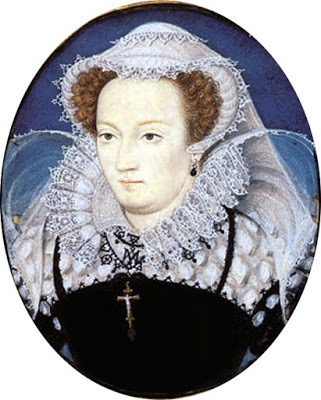 Mary, Queen of Scots: "Mary in captivity,"by Nicholas Hilliard, c.1578
Mary, Queen of Scots: "Mary in captivity,"by Nicholas Hilliard, c.1578I always wanted to write and the stories that interested me always seem to be set in the past. Even at age eleven I was an avid Mary Queen of Scots fan and later I supported – and still do - Richard III. I didn’t have the confidence to attempt writing until I was thirty and even then, I kept it very much a secret enterprise. It was hard work with a typewriter and Snopak!My favourite author will always be Dorothy Dunnett, and it was reading her rather austere conception of Marie de Guise that set me researching and thinking about the character. Dunnett’s conception was a very good one, but I began to think of a softer, warmer personality and she slowly grew in my mind. Matho was a minor character in Fair Border Bride and several people told me how much they liked him and why didn’t I write about him? So, I did. I brought the two characters together in this trilogy. The everyday facts are as close to history as I can get them for everything but the relationship between the Dowager and Matho, because Matho is entirely fictional. I hope Marie had an Englishman who helped her but I doubt it!
The SCOTTISH QUEEN trilogy is filled with action, romance, loyalty and betrayal; set against the turbulent English-Scottish wars of the 1540s, complex characters surround the infant queen of Scotland. Powerful lords fight for their own survival and Englishman Matho Spirston becomes entangled in the plots that surround the valiant Dowager Queen struggling alone to save her daughter’s crown.
Abduction of the Scots Queen(Scottish Queen trilogy Book 1)

Encouraged by Henry VIII’s promised reward, Matho and Harry set out to abduct the infant Scots Queen and bring her to England even though Matho thinks they have as much chance of success as a "duckling chased by a fox.” Others pursue the same quest – namely Meg Douglas, King Henry's headstrong niece, who flatters Matho into helping her and at the same time snares the interest of Lord Lennox, who alternately woos her and the Dowager Queen. The adventures that follow are swift paced and full of twists and turns.
Amazon UK • Amazon US
Queen's Courier(The Scottish Queen Trilogy Book 2)

Against a background of political intrigue and Tudor violence, love is not easy to find or sustain. The Queen Dowager repudiates it, Lord Lennox balances Meg’s attributes against those of the Dowager and the lures of Henry Tudor. Matho Spirston falls for Scots lass Phoebe, the English invasion of Edinburgh brings disaster, Meg nurses her guilty secret and Lennox makes his choice.
Amazon UK • Amazon US
The Queen's Letters(The Scottish Queen Trilogy Book 3)
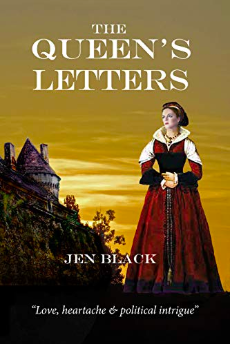
Grief-stricken, Matho puts his life in danger when he volunteers to deliver the Dowager Queen's letters to France. Dodging assassins, befriending teenager Jehan and saddled with the Dowager’s illegitimate, outspoken niece, danger intensifies when he sets out to unmask a powerful enemy and the hangman threatens once more. Meg achieves her dearest wish, but finds it is not all as she imagined.
Amazon UK • Amazon US
Excerpt
From The Queen’s Letters
May 25th 1544, Dieppe
Matho landed feet first, fell onto his backside with a thud that snapped his jaws together and slid toward another drop. A voice called out nearby as he fell over the edge of the roof, dropped into something wet and smelly, and re-bounded onto the hard, cold cobblestoned yard. Pain sprang up in his shoulder as if someone had hit it with a sledgehammer. Snatching a short, swift breath he knew from the stink that he had landed on what the Aydon farmers would have called the muck heap.The voice came closer; French phrases that meant nothing to him. Making careful movements with one hand jammed against his shoulder, he rolled to his knees. The satchel containing the Dowager’s letters hung askew, and the strap dug into his neck.“Monsieur! Monsieur!” A brisk volley of rapid French followed. The stable lad, his torch held high, loomed up beside him.“Help me up,” Matho croaked. His newly learned French had deserted him.A warm hand helped him to his feet. Matho, bent like an old man and none too steady on his feet, stood in the inn yard and gazed open-mouthed at the thirty-foot drop he had survived; then the rosy glow that lit the sky above the building caught his attention. Sparks flew up against the indigo sky and the hollow roar of the flames grew louder as a portion of the roof gave way.He half-turned, lost his balance and grabbed the lad’s arm to stop himself falling. “D’ye speak English?”“Oui, monsieur.”“My French is not good.” He took a deep breath to steady his heart, still going at a gallop.“Many English arrive in Dieppe. They speak no French.” The youth’s tone was either an accusation, or dismissive; most probably both.Matho rubbed a hand across his face. “Aye, well. There’s no call for it back home. What’s yer name?”“Jehan Bourdain.”“Help me get my horse, Jehan? The whole lot is going to be burning soon.” He gestured to the smoke and flames stretching high above the roof of the inn and decided against helping douse the fire. The layout of the place was unknown to him, his French had deserted him and his back pained him every time he moved a certain way. In his present condition, he would hinder more than help.Still gripping the flaming torch, Jehan disappeared into the stable.“Is there not a lantern you can use, lad?” Matho called, stumbling after him. “You’ll set the stable afire with that thing.” He spied a horn lantern on the window ledge, reached for it and grimaced as a pain, like a hot wire, ran through his back.Since Jehan was busy saddling his horse, Matho lit the fat candle inside the lantern and doused the torch in a bucket of water.“Are there other horses here?” he called, breathing in the warm, musty smell of horses, hay and oats.Muffled by wooden partitioning, Jehan’s voice drifted back to him. “One horse only. The Scotsman took the other before the fire broke out.”“Well, my advice would be to get yourself and the other horse well away from here before it burns down.”“I cannot leave. I have nowhere to go.”“Go home.”“This is home.” Jehan led Matho’s horse, saddled and bridled, out into the yard.“The inn belongs to your parents?”“My parents are dead. I work here, and sleep with the horses.”Matho grunted. There was no need to ask how the parents had died. The sweating sickness had taken half a village not far from Corbridge last winter, and Phemie’s aunt in Edinburgh much more recently. Such things were commonplace, but unlucky for the lad. “Well, get as far away from the fire as you can.”Sparks whirled dangerously close on eddies of hot wind, and the roar of the flames grew louder. Harried figures hurled bucket after bucket of water into the building, yet the fire glow captured one window after another. A man staggered out, coughing, and sagged to his knees in the middle of the yard. Four men followed him, a bundled shape carried between them.“Hurry, lad. Let’s be away from here. And get the other horse. We can’t leave it to burn.”He checked his pack was tied behind the saddle, soothed his horse and limped across the yard with the tense, trembling animal nudging his back in its hurry to be away from danger. Jehan followed with a sturdy chestnut on a lead rope which he thrust toward Matho.“I get the saddle.”Before Matho could complain, the lad raced back into the stable and reappeared with a saddle clutched in his arms, a bridle and a large bag slung over one shoulder. Grinning, he speedily tacked up the horse. “Now we go, yes?”A roar rent the air, and fierce light lit their faces. The horses snorted and skittered sideways. “Christ, the roof’s fallen in.” Matho stared at the doomed inn, hardly aware that Jehan had mounted his horse. “And the straw’s alight,” he said with resignation, watching a spark land in the straw bale by the stable door. A shy, tentative flame sprang into life. “Come on, let’s get away from here.”
Jen Black
 Jen lives in the lovely Tyne valley between Hexham and Newcastle in north east England, a stone’s throw from the Roman Wall and with a castle that dates from the 1100’s round the corner. Writing and photography are her main interests and walking her Dalmatian Tim twice a day keeps her fit. She has a degree in English Language & Literature and managed academic libraries for a living. Her father’s family have been traced back to the 1700’s on the Welsh and English border—a place she has never been, but her maternal grandfather worked in Skye, and there is one Scottish great-grandmother in the family tree, so if ever there’s time, perhaps there’s more to learn on that score.
Jen lives in the lovely Tyne valley between Hexham and Newcastle in north east England, a stone’s throw from the Roman Wall and with a castle that dates from the 1100’s round the corner. Writing and photography are her main interests and walking her Dalmatian Tim twice a day keeps her fit. She has a degree in English Language & Literature and managed academic libraries for a living. Her father’s family have been traced back to the 1700’s on the Welsh and English border—a place she has never been, but her maternal grandfather worked in Skye, and there is one Scottish great-grandmother in the family tree, so if ever there’s time, perhaps there’s more to learn on that score.Connect with Jen: Website • Facebook • Twitter.
Published on February 11, 2019 23:00
The Chef’s Secret and The Life of Bartolomeo Scappi, Renaissance Celebrity Chef, by Crystal King #History #Cooking #Renaissance @crystallyn
The rest?
 That’s the fun part. I had the opportunity to make it all up! In The Chef’s Secret, I share two stories—that of Bartolomeo Scappi, and that of Giovanni.
That’s the fun part. I had the opportunity to make it all up! In The Chef’s Secret, I share two stories—that of Bartolomeo Scappi, and that of Giovanni. Here are the details: When Bartolomeo Scappi dies in 1577, he leaves his vast estate—properties, money, and his position—to his nephew and apprentice Giovanni. He also gives Giovanni the keys to two strongboxes and strict instructions to burn their contents. Despite Scappi’s dire warning that the information concealed in those boxes could put Giovanni’s life and others at risk, Giovanni is compelled to learn his uncle’s secrets. He undertakes the arduous task of decoding Scappi’s journals and uncovers a history of deception, betrayal, and murder—all to protect an illicit love affair.
As Giovanni pieces together the details of Scappi’s past, he must contend with two rivals who have joined forces—his brother Cesare and Scappi’s former protégé, Domenico Romoli, who will do anything to get his hands on the late chef’s recipes.
Read an Excerpt
Forty-three days after he first laid eyes upon the most beautiful girl in the world, Bartolomeo had the good fortune to overhear the maids talking about a girl at the palazzo. Two of the serving maids huddled in the pantry near his post where he was prepping nightingales for the cena. When they mentioned the dress she had worn the night before, Bartolomeo realized the principessa was the object of their admiration. One of the maids was a thin slip of a girl who served the cardinale’s sister. The other was a young woman who had caught his fancy for a time the summer before, but soon bored Bartolomeo with her empty gossip. “She’s here from Roma,” the first said, awe in her voice. They talked of the girl’s extraordinarily wealthy family, of her famed dressmaker, and of how long it took to wrangle her curls each morning. When they said her name, Bartolomeo had to put his knife down for fear of cutting himself. Oh, to know her true name! Happiness filled him like a carafe of fine wine. Her name, he thought, was like the taste of strawberries sprinkled with sugar. It was like the summer sun touching the petal of a freshly bloomed flower. That evening, when he gazed out his little garret window, he wished he could shout her name across the rooftops, but he could never say it aloud. To do so was too dangerous, for her and for him. He would take a thousand lashings for his Stella [Author’s note, this is the pet name that Bartolomeo has for her], but he could not bear to have her come to harm. The next morning, Stella stopped Bartolomeo in the loggia. The sky was bright and the October air was still gentle and warm. He was readying to leave the palazzo to go to market when she approached. He was so startled to see her there he stopped in his tracks, mouth agape. The principessa was radiant in a red velvet gown, her hair piled high upon her head. Her beauty was staggering, her skin so clear, her cheeks ruddy and fresh. What a sight he must seem in comparison, with his own hair a tussle of wild waves, a grease stain adorning one sleeve. He hadn’t bathed, and he was certain he smelled too much like onions and ham. She recognized his discomfort and giggled, in a way that immediately eased his fear. She gently touched his arm with one hand, and with the other she pressed a piece of paper into his palm. “What is your name?” He looked around to see who might be witnessing the exchange, but there were only a couple of gardeners in the vicinity, none of whom paid them any mind. “Bartolomeo,” he said, gathering courage. She released his hand and shared her own name. Bartolomeo’s heart sang as she repeated the word he had been turning over and over in his mind since the day before. “Please tell the cook how much I love his tourtes.” Bartolomeo nodded his head vigorously. “I will, madonna, I will.” She dazzled him with another smile. “I liked the radish flower the best, though.” She winked and turned away. He stood there, staring at the curve of her departing body, wondering what had just happened. He stared until she rounded the corner of the loggia. He was light-headed and it felt like he was spinning, like a little bird on a spit, fire rising all around it. The piece of paper in his hand was small and warm. He hurried out of the palazzo and down the cobbled street lining the adjoining Rio di San Luca canal.
When he was sure no one could see, he stopped and unfolded the little piece of paper.
Crystal King
 Crystal King is an author, culinary enthusiast, and marketing expert. Her writing is fueled by a love of history and a passion for the food, language, and culture of Italy. She has taught classes in writing, creativity, and social media at several universities including Harvard Extension School and Boston University, as well as at GrubStreet, one of the leading creative writing centers in the US. A Pushcart Prize–nominated poet and former co-editor of the online literary arts journal Plum Ruby Review, Crystal received her MA in critical and creative thinking from UMass Boston, where she developed a series of exercises and writing prompts to help fiction writers in medias res. She resides in Boston but considers Italy her next great love after her husband, Joe, and their two cats, Nero and Merlin. She is the author ofFeast of Sorrow, which was long-listed for the Center for Fiction’s First Novel Prize, and The Chef’s Secret.
Crystal King is an author, culinary enthusiast, and marketing expert. Her writing is fueled by a love of history and a passion for the food, language, and culture of Italy. She has taught classes in writing, creativity, and social media at several universities including Harvard Extension School and Boston University, as well as at GrubStreet, one of the leading creative writing centers in the US. A Pushcart Prize–nominated poet and former co-editor of the online literary arts journal Plum Ruby Review, Crystal received her MA in critical and creative thinking from UMass Boston, where she developed a series of exercises and writing prompts to help fiction writers in medias res. She resides in Boston but considers Italy her next great love after her husband, Joe, and their two cats, Nero and Merlin. She is the author ofFeast of Sorrow, which was long-listed for the Center for Fiction’s First Novel Prize, and The Chef’s Secret.Connect with Crystal: Twitter • Goodreads • Instagram • YouTube • Facebook • BookBub • Amazon Author Page.
Published on February 11, 2019 22:30
#NewRelease — Will of a Tiger, by Iris Yang #HistoricalFiction #WWII #China @IrisYang86351
Will of a TigerBy Iris Yang
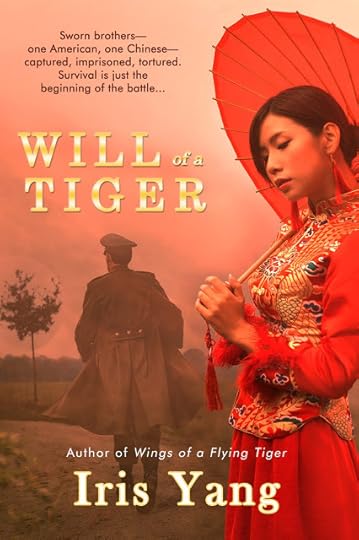
In 1942, Birch Bai, a Chinese pilot, and Danny Hardy, a downed American pilot, become sworn brothers and best friends.
In the summer of 1945, both airmen’s planes go down in Yunnan Province of China during one of many daring missions. They are captured, imprisoned, and tortured by the Japanese for information about the atomic bomb. Just days before the end of WWII, Danny makes an irrevocable decision to save Birch's life.
For Birch, surviving the war is only the beginning of the battle. He must deal with the dreadful reality in China—the civil war, the separation of the country, the death of one friend in the Communist-controlled Mainland and another under the Nationalist government, and his wrongful imprisonment in Taiwan.
From Chungking to Yunnan, and from Taiwan to San Francisco, the sequel to Wings of a Flying Tiger takes readers along on an epic journey.
Excerpt
On the third day, Birch Bai left early in the morning without telling anyone where he was going. He didn’t even know. Hewanted to go to Dead Man’s Pass where Daisy had died, but he didn’t think he could make it that far. So he focused on getting to a cave where Danny and the two girls had lived. It had taken him and Daisy several hours to get there. This time it seemed to take forever. Hiking up a rugged mountain was very different from walking on the smooth and level ground where he’d exercised.
The leaves had changed color. Different shades of green and yellow painted the dense forest. A last batch of wildflowers dotted the edge of the woods. Tree branches stretched over the trail, offering dappled shade, breaking the sunlight into dozens of golden beams. As far as he could see, the uneven path continued upward.
Birch considered turning back. Instead, he pushed onward. The cave was like a magnet, luring him forward.
He rolled his sleeves back to the elbows. His white shirt turned soggy from perspiration, dried in the cool mountain breeze, and soon dampened again. From time to time he wiped a clammy palm on his pants to get a better grip on his cane. Every step became a test of will.
All the while, Birch appreciated what Danny had done four years earlier—the Flying Tiger had had to hop on one leg up the mountainside. Even with his help, and Daisy’s support, the task had been more than challenging. Birch thrust his right hand into his pants pocket, touching the small medicine bottle left by his brother.
Not far from the cave, his prosthetic leg started to give him trouble. It had been hours. He was exhausted. His thigh cramped while he was stepping over two rocks. His leg gave up power, and he stepped into an irregular gap between the rocks. The cane failed to catch him. Birch fell, landing hard on the surface. Pain raced up his leg.
He cursed his luck. Half sitting and half lying on the rock, he folded his arms around the cramped thigh and hugged it to his chest, trying to suppress the pain. Blood leaked through his pant leg where the amputated stump met the socket, and a large piece of skin on his left elbow was scraped. But the pain was only a small part of his dismay. An athlete all his life, Birch felt defeated by his inadequacy. Hiking and rock climbing were once his preferred pastime. Now he was hindered by his injuries.
A small cluster of forget-me-nots bloomed an arm’s length away, reminding him of Danny and Jasmine. He turned his head, keeping his eyes averted, and expelled his frustration in a gust of breath.
Legs stretched before him, Birch remained motionless until his heartbeat calmed and the sweat stopped pouring from his face. He pushed himself to full height and gathered his waning energy. Shutting his mind to the pain in his leg, he pressed onward, despite the protests of every bone, joint, and muscle.
His shirt was so wet with perspiration that when he tried to dust himself off, he left streaks of mud wherever he touched. Xiao Mei kept his clothes clean and starched. He wondered what she would think when she saw him.
By midafternoon Birch finally reached the bottom of the cave. A steep cliff, about one hundred feet, stood in front of him. A natural rock staircase led straight up. Last time he was here, he hadn’t thought twice before he climbed. Even Daisy had done it with just a few cries. But there was no way for him to get up now. He sank onto the first step of the stair to catch his breath.
He longed to see the hideout where Danny and the girls had lived. Four years earlier, he’d met the Flying Tiger for the first time when he came here to pick him up. Danny wouldn’t leave without Jasmine, the woman he loved. Birch had to coax the Flying Tiger, and they left in a hurry. Birch remembered the pictures Jasmine had drawn on the rock wall, even though he’d glanced at them only briefly. The scenes were so striking and familiar.
Two hawks drifted high above him in the vivid blue sky. Birch looked enviously at the birds. He wished he could soar as they did. Danny was up there. Jack stood next to him. And the two young women looked at them in admiration. Now he was so close, barely a whisper away, yet a worldapart. He couldn’t reach the spot where he yearned to be.
A soft wind rustled the birch woods, sending golden leaves whirling around him. The lush hillside was awe-inspiring under warm sunlight. Facing the gorgeous scenery, Birch also thought of Mary. His ex-girlfriend had never been outdoorsy. She preferred museums, concerts, and movies. However, when he told her about the cave, she’d been intrigued. “Promise to take me there, Birch. I’d love to see it. I’ll borrow my cousin’s camera. Those pictures will have historical significance.”
He’d been thrilled that Mary had agreed to hike up the mountain with him. She was different from most young women; she was his equal. Now he was here, but Mary and her camera were nowhere to be found. Only the ring on his left pinky reminded him of her.
Through the trees, the glowing sun slanted little by little toward the horizon. Birch just sat there, thinking, dreaming, and smoking cigarettes one after another.
Finally he stabbed the cigarette out on the sole of his boot, stood up, and faced the bluff. Raising his long arms, he searched the rocky step above to find a good grip. This is what Danny had done four years ago. As he groped for the cracks with his fingers, he wondered if these were the same spots his brother had touched. Taking a deep breath, and using the strength of his arms and left leg, hejumped. He was successful, landing on the first step.
The second one was much harder. The foothold was higher and smaller. Danny had failed when he tried. Now Birch understood why. Landing precisely on the smallsurface was impossible. Danny had been lucky to have people like the herbalist and the teenage boy to catch him when he fell. Falling now without anyone to help him would be dreadful. It could do more damage to his already battered body. And even if he miraculously made it, there was no way he could reach the top. I’ll be back, he declared.
Climbing the cliff became his goal. He vowed he would exercise more vigorously and grow stronger. He promised himself that he would make it to the top. Not just to the cave, I’ll reach Dead Man’s Pass as well. I swear!
Amazon• Open Books
Iris Yang
 Iris Yang, Ph.D. (Qing Yang) was born and raised in China. She has loved reading and writing since she was a child, but in China creative writing was a dangerous career. As famous writers and translators, her grandmother and her aunt were wrongfully accused as counter-revolutionary Rightists, so Iris had to choose a safer path—studying science.
Iris Yang, Ph.D. (Qing Yang) was born and raised in China. She has loved reading and writing since she was a child, but in China creative writing was a dangerous career. As famous writers and translators, her grandmother and her aunt were wrongfully accused as counter-revolutionary Rightists, so Iris had to choose a safer path—studying science.After graduating from Wuhan University and passing a series of exams, she was accepted by the prestigious CUSBEA (China-United States Biochemistry Examination and Application program). At age 23, with poor English, little knowledge of the country, and 500 borrowed dollars, she came to the United States as a graduate student at the University of Rochester.
Later, she received a Ph.D. in molecular biology, trained as a postdoctoral fellow at Cold Spring Harbor Laboratory, and worked at the University of North Carolina. Although she has published a number of scientific papers, she has a passion for creative writing, and her short stories have won contests and have been published in anthologies. Her debut novel, Wings of a Flying Tiger, has been published in June, 2018, and its sequel, Will of a Tiger, has been published in January, 2019.
Currently, Iris is working on a story based on her grandmother, who was the first Chinese woman to receive a master’s degree in Edinburgh in the UK. Iris now lives between Sedona, Arizona and Chapel Hill, North Carolina. Besides writing, she loves hiking, dancing, photography and travel, and she holds a private pilot license.
Connect with Iris: Website • Facebook • Twitter
Published on February 11, 2019 01:40
February 10, 2019
#CoverReveal — Madame Fiocca, by Suzy Henderson #HistoricalFiction #WWII @Suzy_Henderson

Madame FioccaBy Suzy Henderson
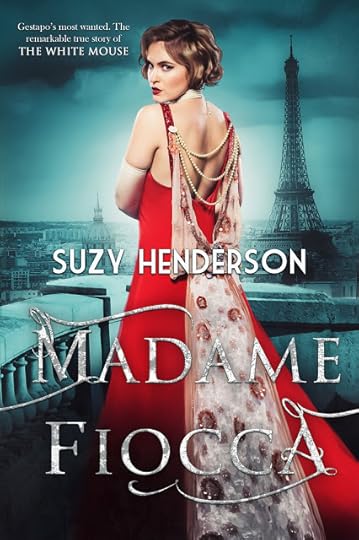
Marseille, September 1939. War is coming. Nancy Wake is a gregarious twenty-seven-year-old about to marry wealthy French industrialist, Henri Fiocca. When Henri is called to the Front to fight, Nancy, determined to help the war effort, travels to Paris to join the Red Cross as an ambulance driver. Every day she witnesses atrocities. When Paris falls, Nancy flees the German oppressors and returns home to Marseille.
France is a nation defeated; its people are in despair. As Nancy recalls the Germans who whipped Jews on the streets of Vienna a few years earlier, she vows to fight for what is right.
A chance encounter with a British officer draws Nancy into the heart of the Garrow escape network, despite Henri’s reservations. Armed with wealth and charm, she convinces Henri that the Germans will never suspect such a woman. But soon she finds herself caught up in a deadly game of espionage.
As the iron fist of the enemy tightens, neighbours denounce neighbours. No one can be trusted. When the enemy closes in, Nancy and Henri face an impossible choice. Has she done more harm than good?
Based on a true story of love and a gripping adventure, “Madame Fiocca” weaves an extraordinary tale of survival and redemption in wartime.

Suzy Henderson
 Suzy Henderson lives with her husband and two sons in England, on the edge of the Lake District. Although she never set out to be a writer, she has always loved reading and experiencing the joy of escaping to another time and place.
Suzy Henderson lives with her husband and two sons in England, on the edge of the Lake District. Although she never set out to be a writer, she has always loved reading and experiencing the joy of escaping to another time and place.In a previous life she was a Midwife but now works from home as a freelance writer and novelist. While researching her family history, Suzy became fascinated with both World War periods and developed an obsession with military and aviation history. Following the completion of her Open University Degree in English Literature and Creative Writing, she began to write and write until one day she had a novel.
Other interests include music, old movies, and photography – especially if WW2 aircraft are on the radar. Suzy writes contemporary and historical fiction and is a member of the Alliance of Independent Authors. Her debut novel, The Beauty Shop, has been awarded the B.R.A.G. Medallion.
Connect with Suzy: Website• Blog • Goodreads• Facebook • Twitter • Google+ • Linkedin
Published on February 10, 2019 23:00
February 8, 2019
Join me in conversation with Historical Fiction author, Collins Hemingway. Collins is also giving away a $25 Amazon Gift Card #Giveaway #HistoricalFiction #JaneAusten @AustenMarriage @hfvbt
Historical Fiction Virtual Blog Tours Presents…
 Add caption
Add captionThe Marriage of Miss Jane Austen Vol.IIBy Collins Hemingway
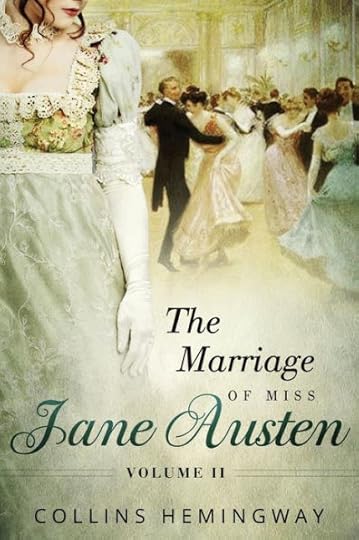
Jane Austen Lived a Quiet, Single Life-Or Did She?Tradition holds that Jane Austen lived a proper, contemplative, unmarried life. But what if she wed a man as passionate and intelligent as she-and the marriage remained secret for 200 years?The Marriage of Miss Jane Austen resolves the biggest mystery of Austen’s life-the “lost years” of her twenties-of which historians know virtually nothing.• Why the enduring rumors of a lost love or tragic affair?• Why, afterward, did the vivacious Austen prematurely put on “the cap of middle age” and close off any thoughts of finding love?• Why, after her death, did her beloved sister destroy her letters and journals?The Marriage of Miss Jane Austen trilogy answers these questions through a riveting love affair based on the history of the times and the details of Austen’s own life.“An enjoyable novel in an imaginative, well-researched series. … A well-researched work of historical fiction … [with] sweet moments and intriguing historical insights. … An incredibly moving portrait of a woman facing loss and love.” Kirkus Reviews
“Hemingway captures the energy of the times, while also writing with the irony and sly humor of Austen herself. … A strikingly real Jane Austen fully engaged in the turbulent times. … She is a living, breathing presence. … [He] displays a notable ability to recreate time and place. … A lively, compelling read, [a] sobering but moving conclusion.” Blueink Starred Review
A Conversation with Historical Fiction author, Collins Hemingway.
My name is Collins Hemingway. I was born and raised in the South and have spent most of my adult life in the Northwest. Consequently, I’ve experienced a broad mix of cultures and people. I’ve done a lot of different jobs, but writing has always been central to all of them. I worked my way through high school and college as a reporter and worked for newspapers till I was thirty. This was when newspapers were becoming computerized, and I ended up taking the lead. That experience led me into the high-tech world as a technical writer and technical marketer. Eventually, I went to Microsoft while PCs were becoming big business. I ended up writing a business book with Bill Gates. I always loved fiction, though, and I wrote as much as I could around my family and career. It wasn’t that much, but some. I was finally able to write fiction fulltime.
It is so nice to meet you Collins. May I ask, what inspired you to write The Marriage of Miss Jane Austen?
I wanted to write a novel that would really test a woman—her intelligence, her spirit, her courage. I have always been interested in the Regency era as an historical period, and the match was perfect. In that time, laws, culture, biology—everything was stacked against a woman. I also knew Austen’s novels pretty well. In very early efforts at the book, I realized I was creating Austen’s voice. There were gaps in her life record, and when I looked deeper, I realized I could use a seven-year “blank” period in her life to make her the main character.
In my head, it’s a book that explores what Austen would have done, had she had these experiences. It’s also how she would have written about it.

I am a huge fan of Jane Austen. Your book sounds amazing. What were the challenges you faced in researching this period of history?
There have been innumerable Regency novels, beginning with Georgette Heyer. I know I didn’t want to do another drawing room romance. I knew I wanted to take Austen into the broader world around her quiet country villages. Truth is, the Regency was a period of enormous and sometimes violent change. Getting my head around all that was happening in Austen’s lifetime, and shaping it into a digestible story, was quite hard. A year or more ago, I counted the number of books I’d read. It was something above 70. Plus hundreds and hundreds of articles. The sheer volume was daunting.
There are many books about the Regency era. Can you tell us three things that set your novel apart?
First, the trilogy is historically accurate, and historically detailed, at the personal level and the geopolitical level. Events from Austen’s life, and the major events of her lifetime, are carefully woven together. Indeed, the personal and political repeatedly interact in important ways to drive the story ahead. Second, the book, though it has a lot of funny moments, is not a light-hearted romance. It’s a story of what marriage would have really been like for a woman in the early 1800s. It has depth and grit. Third, the male and female protagonists are fully developed. They’re good people, and they’re flawed people. Much as they love each other, they fight over big and little things as real couples do. At times, they drive each other bonkers. But the way they challenge each other—and the way they can be painfully honest with each other—is what creates their shared love.
Your book sounds so interesting. Could you tell us what are you currently working on?
In re-reading Austen’s novels and letters, and a good deal of literary criticism about her, I realized I had quite different ideas about her work. I come at her as a professional writer rather than as a historian or sociologist or traditional literary academic. Once I was done with the trilogy, I began writing a collection of essays about Jane Austen developed as a writer. It will cover everything of interest that I couldn’t work into the fiction. The essays will also include new interpretations of some of the most important passages in her novels. I think of the fiction as exploring her inner life that no one can really know, while the nonfiction documents her innovations as a writer.
Thank you, Collins, for taking the time to talk to us today!Scroll down for a fabulous Giveaway…
Giveaway
During the Blog Tour we will be giving away a $25 Amazon Gift Card! Enter HERE!Giveaway Rules
• Giveaway ends at 11:59pm EST on February 9th. You must be 18 or older to enter.
• Giveaway is open to US only.
• Only one entry per household.
• All giveaway entrants agree to be honest and not cheat the systems; any suspect of fraud is decided upon by blog/site owner and the sponsor, and entrants may be disqualified at our discretion.
• Winner has 48 hours to claim prize or new winner is chosen.
Amazon• Barnes And Noble • IndieBound
Collins Hemingway
 Whether his subject is literature, history, or science, Collins Hemingway has a passion for the art of creative investigation. For him, the most compelling fiction deeply explores the heart and soul of its characters, while also engaging them in the complex and often dangerous world in which they have a stake. He wants to explore all that goes into people’s lives and everything that makes tThe hem complete though fallible human beings. His fiction is shaped by the language of the heart and an abiding regard for courage in the face of adversity.As a nonfiction book author, Hemingway has worked alongside some of the world’s thought leaders on topics as diverse as corporate culture and ethics; the Internet and mobile technology; the ins and outs of the retail trade; and the cognitive potential of the brain. Best known for the #1 best-selling book on business and technology, Business @ the Speed of Thought, which he coauthored with Bill Gates, he has earned a reputation for tackling challenging subjects with clarity and insight, writing for the nontechnical but intelligent reader.Hemingway has published shorter nonfiction on topics including computer technology, medicine, and aviation, and he has written award-winning journalism.Published books include The Marriage of Miss Jane Austen trilogy, Business @ the Speed of Thought, with Bill Gates, Built for Growth, with Arthur Rubinfeld, What Happy Companies Know, with Dan Baker and Cathy Greenberg, Maximum Brainpower, with Shlomo Breznitz, and The Fifth Wave, with Robert Marcus.Hemingway lives in Bend, Oregon, with his wife, Wendy. Together they have three adult sons and three granddaughters. He supports the Oregon Community Foundation and other civic organizations engaged in conservation and social services in Central Oregon.For more information please visit Collins Hemingway’s website and blog. You can also find him on Facebook, Twitter, Pinterest, Instagram, and Goodreads.
Whether his subject is literature, history, or science, Collins Hemingway has a passion for the art of creative investigation. For him, the most compelling fiction deeply explores the heart and soul of its characters, while also engaging them in the complex and often dangerous world in which they have a stake. He wants to explore all that goes into people’s lives and everything that makes tThe hem complete though fallible human beings. His fiction is shaped by the language of the heart and an abiding regard for courage in the face of adversity.As a nonfiction book author, Hemingway has worked alongside some of the world’s thought leaders on topics as diverse as corporate culture and ethics; the Internet and mobile technology; the ins and outs of the retail trade; and the cognitive potential of the brain. Best known for the #1 best-selling book on business and technology, Business @ the Speed of Thought, which he coauthored with Bill Gates, he has earned a reputation for tackling challenging subjects with clarity and insight, writing for the nontechnical but intelligent reader.Hemingway has published shorter nonfiction on topics including computer technology, medicine, and aviation, and he has written award-winning journalism.Published books include The Marriage of Miss Jane Austen trilogy, Business @ the Speed of Thought, with Bill Gates, Built for Growth, with Arthur Rubinfeld, What Happy Companies Know, with Dan Baker and Cathy Greenberg, Maximum Brainpower, with Shlomo Breznitz, and The Fifth Wave, with Robert Marcus.Hemingway lives in Bend, Oregon, with his wife, Wendy. Together they have three adult sons and three granddaughters. He supports the Oregon Community Foundation and other civic organizations engaged in conservation and social services in Central Oregon.For more information please visit Collins Hemingway’s website and blog. You can also find him on Facebook, Twitter, Pinterest, Instagram, and Goodreads.
Published on February 08, 2019 23:00
The Coffee Pot Book Club
The Coffee Pot Book Club (formally Myths, Legends, Books, and Coffee Pots) was founded in 2015. Our goal was to create a platform that would help Historical Fiction, Historical Romance and Historical
The Coffee Pot Book Club (formally Myths, Legends, Books, and Coffee Pots) was founded in 2015. Our goal was to create a platform that would help Historical Fiction, Historical Romance and Historical Fantasy authors promote their books and find that sometimes elusive audience. The Coffee Pot Book Club soon became the place for readers to meet new authors (both traditionally published and independently) and discover their fabulous books.
...more
...more
- Mary Anne Yarde's profile
- 159 followers



